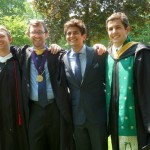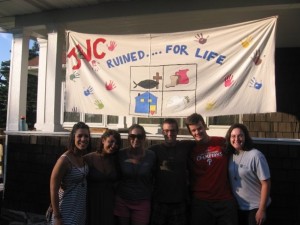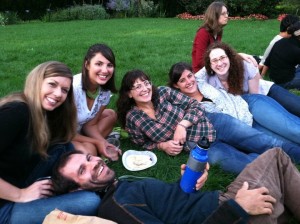Whether you’re applying to internships while studying abroad or applying for a job far away, you may have to participate in a Skype interview this spring. Skype is a great opportunity for connecting you to these opportunities, but it poses some unique concerns. To address these issues, I turned to Jenny Foss of JobJenny.com, who describes herself as “Your job search BFF and tough love expert on finding career passion.”
Her tips for using Skype may help you move from a virtual interview to a real job offer!
. . . . .
10 Tips to Shred the Competition in your Skype interview (by Jenny Foss)
You may already know this, but allow me to reiterate: corporate HR has discovered Skype. And they’re using it with increasing frequency to interview candidates. It’s cheaper than flying you in, and it’s more personal than a phone call.
Welcome to your huge advantage in the job search. Do use it accordingly. Even if you’re not job searching, these tips are helpful for any Skype calls you do, including informal interviews and networking.
If you’re competing with older candidates for your dream job, they may very well have the “years’ experience” edge. But if you’re already comfortable using Skype? You really, truly could outshine that senior level candidate if he or she is “green” with this technology.
Of course, you must then make this your mission. Outshine, friend. Outshine.
To ensure this mission is successful, here are 10 tips to help you shred the competition on your next Skype interview:
- When confirming the interview, provide your Skype account name. Show the interviewer that you’re comfortable with the technology right from the start. Also, ask if you are to dial them, or if they will call you. No sense starting off on this weird note.
- If your Skype name is cutesy or unprofessional, set up another account. And not MadSkillz or HireMaddie. Just your name, please. Or something close to it if yours is already taken.
- Practice first. I recognize that this might sound obvious, but you’d be amazed by how many people don’t do it. Dial up a friend, relative or professional mentor and run through a few mock questions. Check the audio levels, make sure the room lighting looks normal
- Get the eye contact thing down. This can feel a little strange on Skype, but eye contact is VERY important in an interview. Be sure and look into the webcam a large portion of the time. You’ll be tempted to stare at the screen, because that’s where the interviewer’s image appears. But if you look there the whole time? It will come across that you’re looking down the entire time. Eye contact. A must
- Don’t even think about doing it in a coffee shop. Quiet, clean room. Absolutely no environmental hustle and bustle, none. Oh, and when I say “quiet, clean room?” Assume I mean “quiet, clean room with no weird crap in the background. (Editor’s note: Career Planning has rooms you can book to ensure you have a quiet space to conduct your interview!)
- Silence any other phone or potentially interrupting technologies before the interview. That’d be your cell phone, your land line and any other audible alerts that could pop up on your computer during the call.
- Go professional, but remember you’re probably sitting at home. Some professionals will argue me on this, but I think that, for most positions, it’s unnecessary to get all spiffed out in an “interview suit” for a Skype interview. “Hi, I’m sitting in my apartment in pinstripes. Just a regular old day here.” It just seems odd to me. Absolutely look polished, ironed and professional (and wear pants, for heaven’s sake,) but I say suit is not required (unless, of course, you’re in the running for some big Wall Street or CPA gig, then yes, probably.)
- Prepare in the exact same way that you would for a face-to-face interview. Research the company, the industry and the players with whom you’ll be interviewing. Come to the interview with thoughtful questions related to these. Listen. Listen. Listen. And then answer questions calmly and succinctly. Smile. Just like you’d do in person.
- Don’t panic if you have a dropped connection. More than likely, the interviewer already knows that this happens sometimes with a Skype call. In the event it happens on your interview? Take a couple of deep breaths and wait for him or her to re-connect. If five minutes passes and he or she doesn’t? Redial.
- Say thank you. And do so while you’re looking at that webcam.
Finally: pat yourself on the back when it’s over. Your comfort level with newer technologies like Skype may well help you land the dream job!
. . .
More questions on interviewing? Check out more online resources on how to interview including behavioral interviews and interviewing for shy people. You can also set up a mock interview with a Career Planning counselor.










